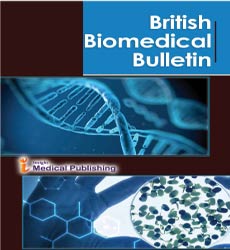ISSN : 2347-5447
British Biomedical Bulletin
Metal/Carbon dot nanocomposite assisted SERS biosensor: trends and perspectives
Abstract
The sensing of bio-molecules based on analytical tools has become one of the rapidly developing scientific fields. Surface-enhanced Raman scattering (SERS) is a highly sensitive method not only for the sensing of lower concentration and volume clinical samples including DNA, drug, RNA, peptides proteins etc in blood, serim and plasma but also sensing of pathogens; single-cell identification and sensing; bioimaging of small molecules; and diagnosis of disease. It also provides significant structural data for biological analytes. One fastest growing field of SERS biosensor design is the use of carbon-based metal nanocomposites as substrate materials, such as metal/carbon dots, metal/single walled nanotubes, metal/graphene sheets, and metal/graphene oxide. In this presentation, we describe the recent trends and perspectives in SERS biosensors. Specifically, metal/carbon dots based SERS biosensors: focusing on fundamental principles for metal/carbon dots based materials for SERS biosensor design, fabrication, and operation, and provide insights into their rapidly growing future potential in the fields of bioanalytical and biomedical , in situ analysis and quantitative analysis. As such, this presentation can play the critical role of a roadmap to direct scientists and researchers toward concepts that can be used in the design and development of next generation SERS biosensors.
Open Access Journals
- Aquaculture & Veterinary Science
- Chemistry & Chemical Sciences
- Clinical Sciences
- Engineering
- General Science
- Genetics & Molecular Biology
- Health Care & Nursing
- Immunology & Microbiology
- Materials Science
- Mathematics & Physics
- Medical Sciences
- Neurology & Psychiatry
- Oncology & Cancer Science
- Pharmaceutical Sciences
